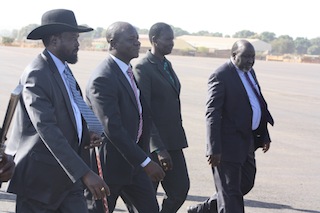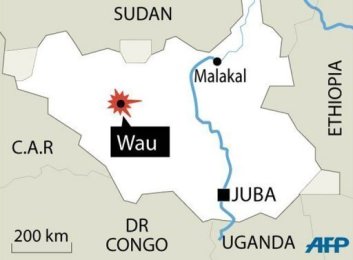W. Bahr el Ghazal calls for unity after protests objecting to county transfer
January 1, 2013 (WAU) – Senior officials and leading members of the community in South Sudan’s Western Bahr el Ghazal State on Tuesday publicly denounced the culture of violence that led to protest-related deaths and ethnic violence in December last year.

Officials and traditional leaders pleaded for reconciliation during speeches addressing citizens at a New Year’s Day event in Wau on Tuesday. They expressed hope that 2013 will bring peace, love and stability with neighbouring countries including Sudan, from which South Sudan seceded in July 2011.
“The development and progress of this country depends entirely on our resolve to work together. It means our unity and responsibility. Our diversity should not be seen and used as our weakness. It should be our strength”, Balanda paramount chief, Angelo Bagari told the crowd.
Angelo Bagari, who has the same name as the Bagari locality, was briefly called in for questioning by the state security after the killing of 26 innocent Dinka civilians in Parajallah, an area under his jurisdiction.
The motives for the killings are unclear although authorities arrested a number of people, including traditional leaders from the area who were suspected to have knowingly not intervened to prevent the deaths.
Parajallah in the Bagari area is the proposed location for the new headquarters of Wau County.
The area is inhabited by the Balanda ethnic group, a community also known in the state as “Fartit”, whose youth groups and intellectuals have expressed dissatisfaction with state cabinet’s decision instructing ex-commissioner, John Peter Miskin, to relocate the headquarters of Wau County in October. Miskin rejected the administrative order and resigned from his position.
Miskin’s rejection and resignation generated a series of protests, which saw youth groups create roadblocks on the roads leading out of Wau town. When the army attempted to remove the roadblocks on Saturday 8 December, some protestors lost their lives when demonstrating against the removal of the roadblocks.
More people were killed when further demonstrations against the incident were held in Wau town on Sunday 9 December. The state government has admitted that eight lives were lost in the protest. The United Nations Mission in South Sudan (UNMISS) initially put the death toll at 10, before revising that down to nine. Former Wau County Commissioner John Peter Miskin has claimed 25 people were killed and 21 others sustained injuries.
Al Jazeera English | Protestors shot at by South Sudan army | 13 December 2012
The deaths in Wau, which have been blamed on South Sudan’s armed forces, have attracted criticism from local and international human rights organizations.
During the December protests, a police station at Jebel Kheir in Wau town was burned down, 53 commercial trucks were set ablaze and three major roads leading to Western Equatoria State, as well as roads to Bagari and Raja County were blocked by protesters.
However on 1 January, the Bagari chief declared the resolve of his community to work together with the state government, explaining that “development takes place only when people are positive and act with clear minds to do the right thing”.
“We can certainly achieve a lot of things, if we as people, regardless of our ethnic backgrounds, can put our acts together, move as one and think together in our courts and offices. We will do wonders to change the face of our localities and overcome odds if we listen to what we say and seek how to forge an understanding as people”.
 South Sudan’s President Salva Kiir, visited Wau on 24 December to meet with the Governor of Western Bahr el Ghazal, Rizik Zachariah Hassan, and local leaders to try and resolve the dispute. Kiir backed the Governor’s insistence that the County headquarters be moved, arguing that this was in line with the ruling party’s (SPLM) policy of bringing services to people in rural areas, not just in towns.
South Sudan’s President Salva Kiir, visited Wau on 24 December to meet with the Governor of Western Bahr el Ghazal, Rizik Zachariah Hassan, and local leaders to try and resolve the dispute. Kiir backed the Governor’s insistence that the County headquarters be moved, arguing that this was in line with the ruling party’s (SPLM) policy of bringing services to people in rural areas, not just in towns.
The Governor of Warrap State, Nyandeng Malek Deliech and Governor Chol Tong Mayay of Lakes State visited Wau town on Christmas Eve to hold a series of meetings with citizens and government officials.
Governor Hassan has formed a committee to investigate the killings and has promised that those involved will be identified and charged. Hassan also urged citizens from the affected states not to seek revenge because this would only serve the interests of people who were attempting to destabilise the state.
On New Year’s Day, the Deputy Governor, Morris Yel Akol Tiit said: “Only together can we [help] the people of this state and indeed in South Sudan as a whole, move progressively, cope with any odds, solve the most complicated tasks, build a strong, successful state, a modern, prosperous and free society.”
Akol served as finance minister for nearly three years under Governor Hassan before he was promoted to deputy Governor in July 2011, replacing Effessio Kon Aguak who later became an adviser on peace and reconciliation.
He made no reference to the recent incidents in which civilians were allegedly killed and injured by South Sudan’s armed forces. The protests also resulted in serious damage to property in Wau.
(ST)

